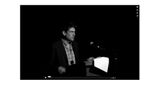User talk:Simon/Making public
13.12.19 - Matthew Stadler, at Leeszaal
Matthew Stadler is a writer, and one of the founders of Publication Studio, a federated publishing house which operates worldwide. I met with him at Leeszaal, where we discussed our mutual interests in texts, reading, libraries and open access to knowledge. Matthew was able to give some valuable insights on what makes certain publishing models, (and libraries) successful, including Publication Studio, and Leeszaal, where he works as a volunteer. His response to my bootleg library was very encouraging. It affirmed some of the hypotheses I have proposed, and offered some insights that I found quite inspiring:
- a successful publishing practice resembles an estuary, which is a fertile ecological environment formed by the confluence of saltwater, freshwater and minerals. The metaphor is extended to the practice of contingent librarianship, which doesn't opt for one stream of activity, but provides a meeting point of many
- what I'm most interested in is readers, and shared the act of reading as the thing that binds together a library
- the haptic experience of reading a printed book is fundamentally one of a circuit-based spatial relationship with the book - holding the verso with the left hand, and the recto with the right. In this way the body and the text form a loop
- small, spur-of-the-moment actions, in response to immediate needs is most effective in establishing a collective publishing project; i.e. you look at what you have to do today, you print a book, tomorrow you develop the library, a little at a time, rather than as part of some grand scheme that can very quickly become oppressive and driven by ideology instead of a practical response to circumstances
As a writer, Matthew's interests are in the extension of the life of the book post-publication, and how it survives after it is published. There is quite a proliferation of "unofficially published" books made by artists and designers, but these are usually tied to an event: an artwork, a catalogue, a book launch; soon to be forgotten. For him (like myself), the visibility of readers supports the argument for a library's existence. This was the impetus behind a series of books published by Publication Studio, which were free to annotate using software called an.notate. Further to this interest, he co-wrote and published a book called Revolution: A Reader, which is a book made from annotations made on the topic of revolution. I showed him the system of annotation on the bootleg library, which at present is just a link to an etherpad in the description. He pointed out that while the etherpad is a fertile and dynamic collaborative writing environment, having annotations in a separate window to the text lacks fixidity, and proximity.
Matthew also brought up the topic of renumeration for publication - asking if I charged a fee for the services I offer. To me, it is not only unnecessary, but also contradictory to the type of culture the bootleg library should foster. I prefer to exchange bootlegged books for something else, and I'm printing and making them at very little material costs, only my time is expensive. I realise that this luxury is one I can afford only now, and that the question of money (as a necessary part of sustaining a publishing practice) will be an important one to address in the future.
I'm quite interested in the aspect of publication that Matthew champions; one that ensures the survival of a publication after the fanfare of the launch event. Thinking about the use of the text in 20, 30 years time gives a very different set of priorities to thinking about how it will be read as a "current" publication. The way texts are read, distributed, and most importantly shared, precipitates a form that must be durable, and suitable to the long-term needs of the public it is presented to.

